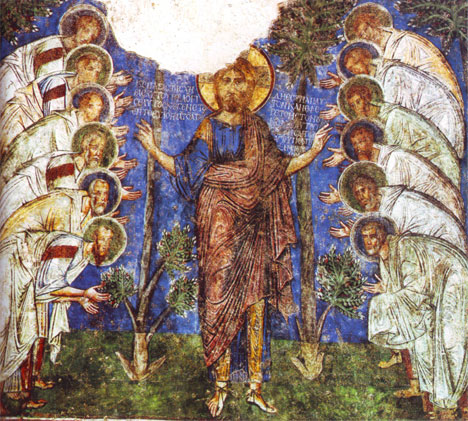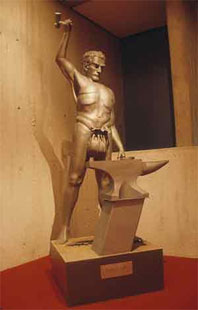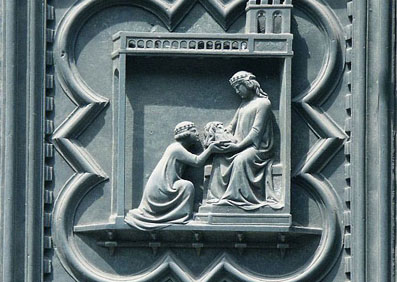Dec
3
2013

“John was not a court prophet but a man in skins, like Adam, representing both the goodness (covering) and severity (death) of God. John’s food and shelter, like his ministry, came directly from God, and was not the result of the wisdom of men.”
Matthew 10-15: HIERARCHY
The theme of the second major cycle of Matthew is the Hierarchy phase of the Covenant, which concerns the delegation of authority. This section contains seven cycles, a complete “week.” Identification of the structure answers some interesting questions concerning Jesus’ directives.
Continue reading
Comments Off | tags: Covenant Theology, Herod, Herodias, John the Baptist, Literary Structure, Matthew | posted in Bible Matrix, Biblical Theology, The Last Days
Nov
1
2009
and the Usefulness of the Blood of Abel
 “…you have come… to the blood of sprinkling that speaks [more useful, more serviceable, more advantageous] things than [that of] Abel.” Hebrews 12:22-24
“…you have come… to the blood of sprinkling that speaks [more useful, more serviceable, more advantageous] things than [that of] Abel.” Hebrews 12:22-24
In Biblical Horizons newsletter 203, James Jordan argues that since Cain’s “exodus” to build a city occurred around 130 years after the Fall, he was publicly humiliated before thousands. He would have been accompanied by at least 1000 people, so he didn’t build the city on his own.
This means that Adam, like Solomon, was father to a divided kingdom. 1 Kings presents Solomon as a new Adam, even down to his naming of animals in his biological studies. Cain was like Jeroboam, shown mercy, given a chance, but who then caused Israel to sin.
What does Genesis give us after this? Continue reading
7 comments | tags: Abel, Altar of the Abyss, Athaliah, Cain, Genesis, Hebrews, Herodias, Jeroboam, Solomon, Tabernacle | posted in Biblical Theology, The Last Days
Apr
10
2009

Peter Leithart observes that both Esther and Herodias’ daughter are promised up to “half the kingdom.”
There are echoes in the story of the book of Esther, at least in Mark’s version of John’s execution. Matthew tells us that when the daughter of Herodias danced before Herod, he promised with an oath to give whatever she asked. Mark records Herod’s words somewhat differently: He promises not just to give what she asks, but promises to give up to half his kingdom (Mark 6:22-23). This is the same promise that Ahasuerus gives to Esther when she says she has a request for him (5:3, 6).
In both passages, we have a woman, a queen, requesting something from a king. In both stories, we have a king promising half his kingdom. We could even say that both Esther and Herodias are asking for someone’s head. Esther knows that Haman is plotting to kill all the Jews, and she is asking for his life in order to protect the Jews.
But there the similarities end. Esther appeals to the king to save the faithful in Israel, while the daughter of Herodias is instructed instead to ask for the head of a faithful man, albeit a troubler of Herod’s kingdom, a prophet who has made life difficult for Herod because of his faithfulness. Instead of being like the protective Ahasuerus in Esther, Herod is more like Haman, seeking to wipe out the true Israel.
http://www.leithart.com/2008/06/21/herodias-and-esther/
Esther, like Deborah, and Jael, typifies Mary, the warrior bride whose offspring would crush the head of the serpent. A Nazirite growing his hair during a ‘holy war’ vow identified him with submission and purity. John uses Nazirite symbols to describe the bad Nazirites, the Judaising “locusts” troubling the church.
“And they had hair as the hair of women, and their teeth were as the teeth of lions.” Revelation 9:8 (and Joel 1:6)
They were negative-Nazirites, men who had taken vows to destroy the apostles (Acts 21:23). With the charm (and hair) of an army of Absaloms, their holy war was stamping out the Son of David. They were the false warrior bride, Herodias, seeking the head of the true Nazirite, Christ, in revenge for the victory over Goliath at the cross. This Herodias-Jezebel-Babylon of superseded Judaism would wipe out the true Israel at any cost.
Comments Off | tags: Babylon, Esther, goliath, Herodias, Jezebel, Nazirite, Peter Leithart | posted in Biblical Theology




























